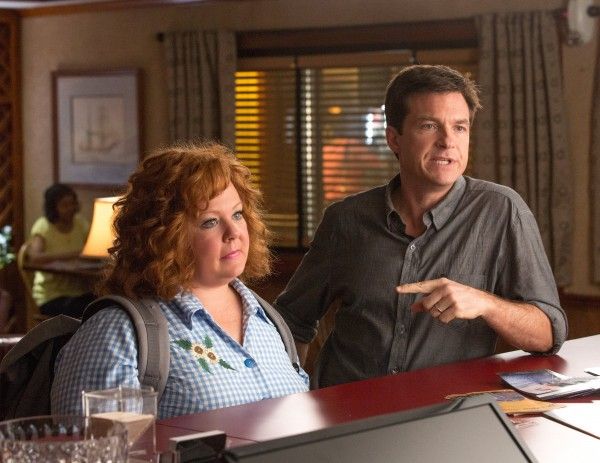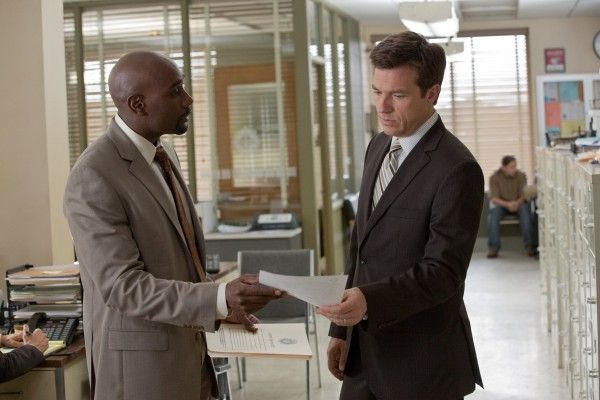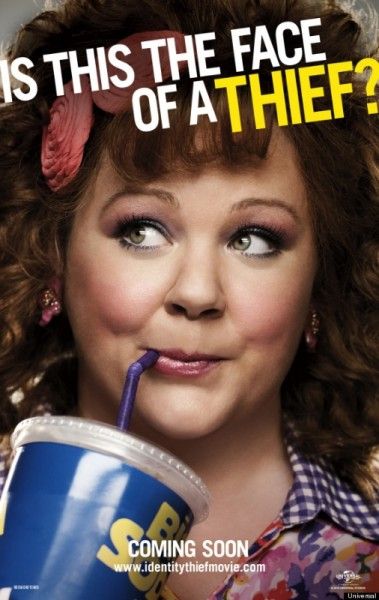Identity Thief is the hilarious new comedy, from director Seth Gordon (Horrible Bosses) and screenwriter Craig Mazin (The Hangover 2), that follows what happens to a regular guy when he is forced to extreme measures to clear his name after a woman who loves to live it up steals his identity and ruins his life. When Sandy Bigelow Patterson (Jason Bateman) is accused of a series of crimes, the innocent man realizes that a woman named Diana (Melissa McCarthy) is using his ID to do and buy whatever strikes her fancy, and decides to track the woman down and confront her, in order to get his life and name back.
At the film’s press day, Craig Mazin spoke to Collider for this exclusive interview about how he came to the project, collaborating with Jason Bateman on the idea and tone for the film, and how it affects his writing process to know which actors he’s writing for. He also talked about the experience of being a part of the highly successful The Hangover franchise, whether he and Todd Phillips took the criticism of the second film into account when writing The Hangover Part III, making films for audiences to enjoy, and the animated feature Turkeys (featuring the voices of Amy Poehler, Owen Wilson and Woody Harrelson), which he’s writing and producing.
Collider: How did you come to this project? Were you given the script that had already been written?
CRAIG MAZIN: There was a script that was written, but I didn’t actually get it. What I got was the idea. Basically, Jason Bateman and Scott Stuber, our producer, called me and said, “Look, here’s this idea that we have from this screenplay. We want to recast it as a man and a woman, and we want it to be Jason and Melissa McCarthy. What do you think?” They didn’t give me the original script. They gave me an interim script that a terrific writer had done, but it was just a totally different kind of movie. It was actual quite beautiful in places. It really was. It was just a different kind of movie than what everybody was looking for. So, in a sense, what I really had was an idea, and I loved the idea and I loved the pairing of Jason and Melissa.
And so, Jason and I basically sat for a few weeks and talked through a story. We started from a place of forgetting about comedy or plot, or any of that stuff and just said, “What’s wrong with these people? What’s wrong with her, and what’s wrong with him? And why does this matter to us? What’s the relevance to us?” Ultimately, it’s not a procedural. These comedies are about the human condition, and this one, more so than probably any I’ve ever written. So, we just worked it all through, and then I went and wrote it. Seth Gordon came on board, on the basis of that draft, did a rewrite, and then the cameras started rolling.
That’s about as fast as it’s ever happened for me, I have to say. Initially, Seth and I had been talking about doing a different movie together, that he was attached to at another studio, and we had a great time talking about that. But, a couple months later, I was like, “How’s that other thing going?,” and he was like, “You know, the usual. It’s taking its time.” I was like, “Well, there’s something here that’s pretty much on the launchpad. I’m not sure how it happened so fast, but let’s go.” So, he came in and impressed everybody, and here we are.
Is it cool to get to go into production that fast, so you’re not sitting around and waiting for something to happen?
MAZIN: It’s the best! There’s two ways that movies get made, it seems. There are the movies that should never be made, and resist being made until, through sheer brute force, somebody finally makes it. And then, there are the movies you can’t stop from being made because they just want to be made. That’s not always aligned with quality. It’s just one of those things. I’ve been doing this for a long time, and you know when you’re on one of the former types of movies where you’re just moving paper around. Nothing is sadder than an unproduced screenplay. So, when I came on board this one, I thought, “Jason is great, and Melissa is great. They’re stars. This is a terrific concept. It’s marketable. All the things that are normally in my way, are not in my way. The only thing now in my way is me. Everything else is ready to go.” It’s funny, when we were talking to Seth about coming on, as a director, I had written a pretty extensive outline. I like to do a 25 or 30-page outline that goes scene by scene and describes what’s happening, why it’s important and why it matters. He turned to me and was like, “This treatment is great. The idea is great. These actors are great. Now, it’s pretty much up to you. Don’t blow it!” And it was. But, I loved writing it, and I loved the way it turned out.
How does it affect your process when you know who you’re writing for?
MAZIN: If I don’t know who I’m writing for, I make it up and pick somebody I’m writing for. That’s really the only way to do it. When I’m writing stuff, I need to watch the scene in my head, like a little movie, or else it just feels stupid. It just feels very written. There are things that actors do, and faces they make and pauses they take and their rhythms. You need that. You won’t always get the person you thought of. I’ve been lucky that the last few movies I’ve done, I’ve known exactly who I was writing for. That’s a huge advantage for any screenwriter, as far as I’m concerned, with the particulars of that person’s voice, their attitude and their look. This was a very different thing for me than The Hangover because I even had the characters when I came onto The Hangover series. I knew the way those guys sounded. I watched them in the theater. With this, I was building characters and making new ones. But, Melissa and I sat in a restaurant and talked about her character, before I started writing anything. I said, “What does she wear? Tell me about her make-up. Let’s just talk, literally, about everything ‘cause I need to see it.” You can see now, in the movie, it’s a part of her thing. I think it’s everything. If you’re not writing for somebody, you’re writing for nobody.
What do you think was the best input you got from the people you collaborated with on this, that helped most in shaping the script?
MAZIN: The truth is that there wasn’t any one little magic bullet, as much as there was tremendous support for what Jason and I initially set out to do. It really was Jason and me, in the start. We made a tonal decision about what we wanted to do. We wanted to make a really funny comedy that wasn’t afraid to be very human, very touching and very real, and wasn’t afraid to show tears and to be honest. And we wanted to protect that tone, above everything else. Everything else that happened was just about everybody on board and supporting that. There are a million little things that you pull and you move around. I will say that the single best casting moment had to be Eric Stonestreet. He was so perfect. Screenwriters always get the, “How much is improvised?” question, and we always get irked by it ‘cause we’re like, “A lot less than you think.” We write the movie, and they basically need to shoot what we write, but they do improv. I always hate that question ‘cause I always feel like it’s putting the writer in competition with the cast. But, Eric Stonestreet absolutely elevated that material. We had in place the basic idea of that character. We certainly had the turn where he talks about his past and why he’s afraid and what he wants to do. All the dramatic intention was in the script. But, the way he did it and his individual lines were just him. He was amazing! That was a big one.
As a writer, you hand something over to the director and you have no idea how the movie will ultimately turn out. Is it difficult for you to hand your work over to a director, and are you okay with actors going off of the script?
MAZIN: I would much rather have the actors wander off than the director because they will find stuff in the moments of the performance. Ideally, the director and the writer have a shared sense of vision. The director will be able to say, “Okay, you’ve actually wandered into bad territory here.” But, this film is between the lines of the dramatic intention of what we wanted to achieve. In fact, it’s better, and that’s great. I’ve been lucky that the directors I’ve been working with lately – Todd Phillips and Seth Gordon – are very much in partnership with me. We don’t have arguments. We don’t say, “No, you’re doing it wrong!” We know what the scenes are supposed to be, and then they bring them to life, and I have yet to be disappointed. I think Seth did a terrific job. It was our plan, and it came out like our plan. I loved that! This is a comedy with legitimate humanity to it. To me, that’s why I’m really proud of it.
Making a great film doesn’t always translate to big box office numbers, so what does it mean to you to be a part of the highly successful The Hangover franchise?
MAZIN: Well, it’s scary. The thing that keeps me from freaking out is that I have Todd [Phillips] as my writing partner and he’s the maestro. In the back of my mind, it always seemed to me that he wouldn’t let us write something that was wrong because he was going to have to shoot it. He knows those characters and he made that world. But, it’s scary, anyway, because you want to please people. Critics aside, and whatever their issues were, I sat with audiences when we ran The Hangover 2 for the first time and they loved it. We had a great cinema score, which is a nice thing. I want the audience to love it. Sometimes critics disagree with the audience, and that’s fine. I make movies for the audience. I guess I hope that the critics like it, but on the other hand, I just really want the audience to like it.
When you hear criticism for a movie, like there was for The Hangover 2, and you know you have to write The Hangover 3, do you put it out of your head or do you take that criticism into account?
MAZIN: Kind of. It’s not so much that the criticism makes you make different choices. Rather, the criticism makes you start anticipating the reaction to your choices, and you’ve gotta get that out of your head. We always knew the third movie was not going to have these guys waking up from a night that they’ve forgotten because we understood that it needed to happen twice, so that the third movie could end it by addressing why it happened twice. But then, you think, “They’re going to go, ‘Well, I guess they listened to us,’” but no. And then, what inevitably ends up happening is that I look at Todd and he looks at me, and we go, “Wait a second, why are we even talking about this? Who cares! They’re going to say what they want to say. It doesn’t matter!” It didn’t matter on The Hangover 2, at all, and it’s not going to matter on The Hangover 3. Either people will like it, or people won’t, meaning the audience. That’s it.
You’re also working on an animated feature, called Turkeys?
MAZIN: Yeah, it’s this cute little animated movie. Animation takes years. [The process is] so different. I really wrote a draft of that script, years ago. I wrote it right after I got back from Bangkok. And then, they go through this endless process of refining it and creating it. It’s so slow. They animate like a second a day. Animation is the craziest thing, to me. But, it’s this really cute story about these turkeys that go back in time to get to the first Thanksgiving to get turkey off the menu. It’s Owen Wilson, Woody Harrelson and Amy Poehler, who are really funny, good people. Jimmy Hayward is the director. He made Horton Hears a Who, and he’s a great guy. I just occasionally cycle back in for a few days, look at some stuff, give them a couple of ideas, and then I leave again. Then, I come back months later and am like, “How about now?” It’s totally different. That is a true marathon.
What do you think it is that draws you to writing comedy?
MAZIN: I find comedy to be the most difficult and rewarding form of film. I don’t know why. It’s probably just my DNA. I only know what it is about it that pleases me. I love characters going through absurd situations. I love the physically of literally laughing in a room full of people, at somebody struggling to figure out what the hell just happened to their world and their lives. I also love that comedy gives you a golden opportunity for characters to find peace, in a way that they didn’t have, and in a joyous way. Comedy is a celebration of the insanity, stupidity and absurdity of life. I really do think life is absurd, so I enjoy it, moment-to-moment. That’s the fancy pants way of saying that I like laughing. It’s a great feeling to make people laugh, only to be countered by the miserable feeling when you’re not. That’s the worst. And I’ve been there, too.
Identity Thief opens in theaters on February 8th.




